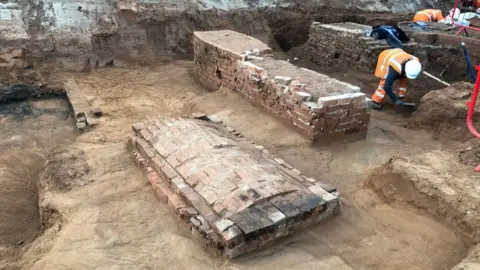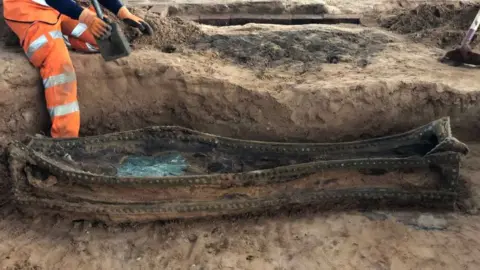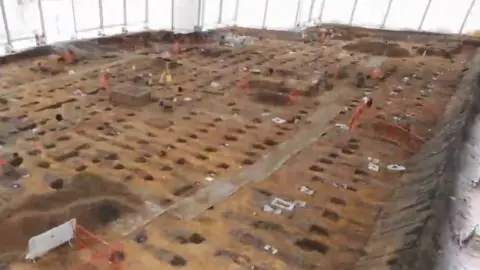Birmingham burial site excavated for HS2 station
 HS2
HS2Archaeologists have excavated 6,500 skeletons from a 19th-Century burial ground to make way for an HS2 high speed rail station.
The project at Curzon Street station in Birmingham took 12 months to complete.
Park Street burial ground was opened in 1810 as an overflow cemetery for St Martin-in-the-Bullring. It closed to public burials in 1873.
Anti-HS2 protestors accused HS2 of "desecrating" graves for a "cash cow" project.
The remains will be reburied in consecrated ground at a location identified in consultation with the Church of England.
 HS2
HS2Archaeologists are currently examining the skeletons and artefacts discovered within the burial ground including coins and necklaces.
But Joe Rukin, the campaign manager for Stop HS2, said: "Desecrating the final resting places of these people would never have happened for a normal development.
"They've claimed it's in the national interest to do so."
An HS2 spokesman said burial excavation was "not uncommon" to make way for infrastructure. He said the remains were handled by hand rather than machine and carried out under cover to protect dignity.
Mike Lyons, HS2 West Midlands Programme Director said: "We already know that Birmingham played a pivotal role in the Industrial Revolution and HS2's archaeology programme will allow us to tell the story of the skilled workers who fuelled it."
Claire Cogar, the lead archaeologist from MOLA Headland, said: "By analysing the archaeological remains, we hope to build a picture of the lives of the people who built Birmingham and made the city what it is today, from the diseases they suffered and what they ate, to where they came from."
One burial contained a bone-handled knife, another had a figurine and others contained dinner plates.
 HS2
HS2The London to Birmingham section of the line was due to open at the end of 2026, but it could now be between 2028 and 2031.
The cost of the project has risen from £56bn to between £81bn and £88bn, it was revealed in July.

Follow BBC West Midlands on Facebook, on Twitter, and sign up for local news updates direct to your phone.
